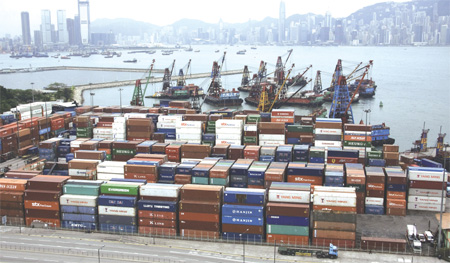Export rally more likely later, not sooner
Updated: 2009-12-24 07:33
By Joey Kwok(HK Edition)
|
|||||||||
|
Shipping containers are stacked in the Kwai Chung shipping terminal in Hong Kong. Export market opportunities are arising on the mainland as it has been showing signs of strong growth in retail sales. Bloomberg News |
HONG KONG: For David Kam and many other local exporters in Hong Kong, 2009 has, without doubt, been a difficult year for business. Amid the volatile global economic conditions, Kam and other exporters in the city are now seeking ways to further develop the market on the mainland.
Kam, whose company exports retail goods including information-technology products and office stationery to the US, Europe and the mainland, said his company's export business to the US and Europe plunged almost 80 percent last year, when it was hit hard by the global economic recession.
"Our company reported very limited orders from the US and Europe right after the global financial turmoil. However, the export trade started to pick up again in mid-2009, as global consumer sentiment gradually bottoms out," said Kam, who is also the chairman of the Hong Kong Small & Medium Enterprises (SME) Development Association.
Kam said his company's export business in November saw single-digit growth year-on-year. He expects the overall export trade to drop around 10 percent in 2009 and 2010.
"We hope sales during Christmas holiday can further boost our export business in the near term," Kam said.
Consumer spending and retail sales in the US and Europe have remained sluggish, following the onset of the global financial meltdown. The decline also took a toll on the city's export of retail services and consumer goods this year.
More than one year after the crisis, economists believe consumer sentiment in the West will show only a gradual and slight recovery in 2010, as US consumers, the world's major spenders, have become more frugal after the crisis.
"The US personal savings rate rose from near zero to about 5 percent recently. This group looks unlikely to go back to their old spending habits for years to come," said Irina Fan, senior economist at Hang Seng Bank.
Depressed by the financial turmoil, total exports in Hong Kong have dipped into the red since November 2008, plummeting into minus 23 percent in February 2009, a record fall in almost half a century.
"The outlook for exports is not so bright. The pace of a global rebound is likely to be tepid, as private sector activities remain weak," she added.
Despite the gloomy outlook in the near term, the Hong Kong Trade Development Council (HKTDC) said local exporters are becoming more optimistic over the medium-term.
The council's recent survey showed that fourth-quarter export index - which traces export performance and prospects of Hong Kong traders - returned to expansionary territory for the first time in more than two years.
HKTDC also expects total exports in Hong Kong to rebound moderately by 5 percent in 2010, benefiting from a gradual recovery of the world economy.
Edward Leung, the council's chief economist, said many exporters expect the recent surge in asset prices in some locations will help prompt a rebound in consumer and business confidence in selected markets, such as the mainland.
The relatively resilient economic conditions on the mainland are helping Hong Kong exporters sustain business growth amid the financial crisis.
Leung said that the mainland has been showing signs of strong growth in retail sales, which are expected to rise by more than 15 percent in the first ten months of 2009.
Hong Kong exporters are of course aware of market opportunities arising on the mainland.
Hong Kong businessman Kam said his company will gradually expand its export trade to the mainland in the coming years, in order to reduce reliance on the markets in the US and Europe.
"While the rest of the world is targeting exploring the mainland market, Hong Kong SMEs will have no reason to refrain from expanding into the mainland," Kam said, hoping that the mainland market can contribute 35 percent of the company's total revenue in the foreseeable future.
There are, however, challenges for Hong Kong exporters in targeting the mainland market.
HKTDC's Leung said Hong Kong exporters should take heed of the diversity of the consumer base on the mainland, not least between the large cities in the coastal regions and the second-and third-tier cities of the inland province.
"Consumer preferences aside, there are big differences in income levels and spending power," Leung said.
Billy Mak, associate professor of finance and decision science at the Hong Kong Baptist University, said Hong Kong companies will face intensive competition with their mainland counterparts, as they exports products back onto the mainland.
He added that local exporters will also have to adopt different regulatory frameworks as they further expand the mainland market, which will take time.
(HK Edition 12/24/2009 page6)
